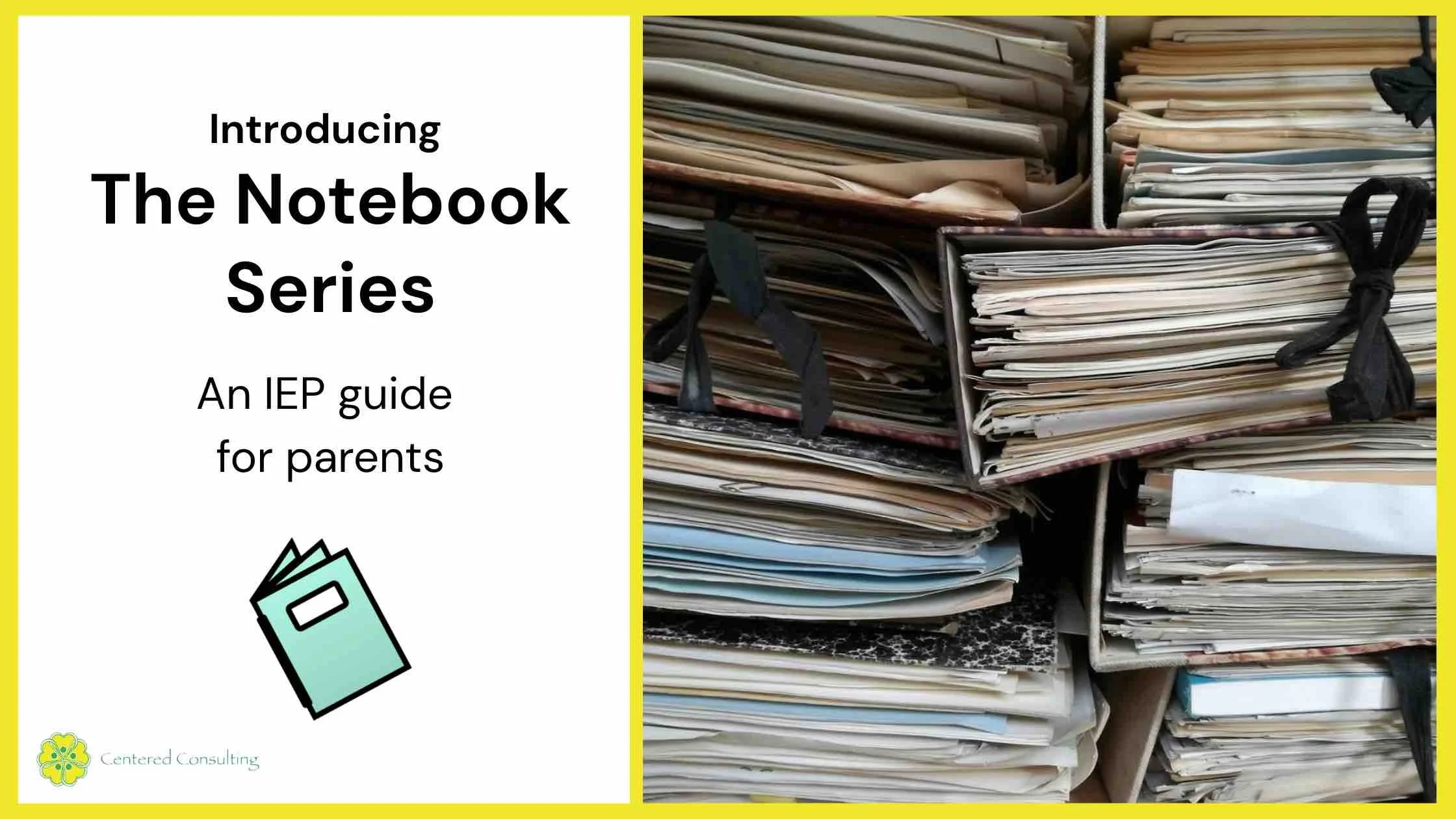Introducing The Notebook Series: An IEP Guide for Parents
Welcome to The Notebook series! In this series, I will provide you with clear information about each type of IEP, what to expect throughout the various IEP processes, and guidance for ensuring your child receives the services they need to thrive.
At the end of the series, you will have the information you need to confidently navigate your child’s next IEP meeting.
What is The Notebook?
The Notebook is both a concept and a tool for engaging with the IEP process. The Notebook is, in fact, an essential tool. It houses years of IEP invitations, drafts of assessment reports, progress updates, and countless drafts of various IEPs—a student’s educational history. This notebook is no lightweight and, after a few years, it can weigh in at around seven pounds.
The Notebook can serve a variety of purposes for parents:
For some, it provides a sense of security—everything they may need to know about their child’s education and development is in there.
For others, it’s a weapon to defend themselves—and their child—from teams who they worry may not have their best interest in mind.
And, for many, it’s a reminder to everyone in the meeting why they’re there—to build a program for their child.
Regardless of the specific purpose, The Notebook can act as a powerful aid for parents.
Ian’s IEP Notebook
My initial encounter with The Notebook occurred during my first year teaching. The mother carrying this particular notebook had been through nine years of IEPs by the time I met her. And, I’d already been warned by others on the IEP team that she was “demanding and difficult”.
But such labels didn’t put me off. I was never one to shy away from working with a parent who knew exactly what they wanted for her child—and made sure the IEP team knew it, too. In fact, I enjoyed working with—and learning from—those parents.
A few minutes before the IEP meeting, the mother walked into the conference room. She was holding the largest binder I’d ever seen. “Ian’s IEPs” was written boldly in black permanent marker across the cover.
After taking her seat and unloading the binder onto the table in front of her, she looked around the room and said, “We are all here for my son, Ian. I’ve been his advocate since he was 3 years old. I’ve always fought to make sure he gets what he needs, and I’m ready to do so today.”
At that moment, there was no doubt that this mother had set the tone for the rest of the meeting. In a room full of special education experts, she established herself as a fellow expert. Her expertise was in her son. And The Notebook was evidence of years of both the knowledge she’d gained and struggles she’d overcome—for him.
The rest of the meeting ran differently than previous IEPs I’d been involved in. The team actively sought her input, consistently included her in conversations and incorporated her feedback. It was clear to me that the team engaged with her in this positive way because she had established herself as an expert and an equal partner in developing her child’s IEP.
Shifting from fighters to experts
Armed with The Notebook and ready to fight for her son, she was treated as a knowledgeable participant. Her expertise was respected. But she’d had to endure many years of negative experiences. Those experiences had taught her how to take control and establish her role on a team.
Since that IEP meeting, I’ve often wondered:
What if parents didn’t feel the need to lug around a tome of such titanic proportions?
What if parents could walk into these meetings feeling confident that everyone in the conference room was already on their side?
What if parents didn’t feel like they had to prepare to fight?
From my experience, The Notebook is a response to how overwhelming the IEP process can feel for parents. IEPs have gained the reputation of being really hard. Parents grow to dread them. And, for good reason. Even an IEP with positive outcomes can include disagreements.
But, what if shedding light on the process behind an IEP could help to alleviate some of the stress? What if instead of labeling parents as demanding and difficult they were recognized for their unique expertise and perspective? What if the more information parents had about IEPs the more engaged and confident they felt?
A different approach to IEPs
Throughout The Notebook series, my approach is to
Bring transparency to the IEP process
Help parents develop confidence in their role as experts in their child
Ensure parents have the information they need to be active members of their child’s IEP team
Each post within this series will cover one type of IEP
Initial IEPs
Annual IEPs
Triennial IEPs
Transition IEPs
30-Day IEPs
Amendment/Addendum IEP
For each type of IEP, we will explore every step of the IEP process, including
What Happens Before the IEP
Draft Documents You Should Receive Before the IEP Meeting
What to Expect During the IEP Meeting
What Happens After the IEP
The Notebook series is intended to be a helpful tool to support parents as they move through the IEP process. Like the actual Notebook many parents assemble, the information shared in this series offers parents knowledge, protection, and recognition.
It’s not easy stepping into the role of advocate for your child. But I’m here to walk you through everything you need to ensure your child receives the services they need to thrive.
Stay centered out there, friends.
Mischa

